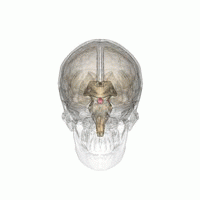Hyperpituitarism
Editor-In-Chief: Prab R Tumpati, MD
Obesity, Sleep & Internal medicine
Founder, WikiMD Wellnesspedia &
W8MD medical weight loss NYC and sleep center NYC
| Hyperpituitarism | |
|---|---|

| |
| Synonyms | N/A |
| Pronounce | N/A |
| Specialty | N/A |
| Symptoms | Headache, visual field defects, hormonal imbalance |
| Complications | Pituitary apoplexy, vision loss, hypopituitarism |
| Onset | Variable, depending on the underlying cause |
| Duration | Chronic |
| Types | N/A |
| Causes | Pituitary adenoma, hyperplasia |
| Risks | Genetic predisposition, radiation exposure |
| Diagnosis | MRI, CT scan, hormone level tests |
| Differential diagnosis | Hypopituitarism, pituitary tumor, Cushing's disease |
| Prevention | N/A |
| Treatment | Surgery, radiation therapy, medication |
| Medication | Dopamine agonists, somatostatin analogs |
| Prognosis | Variable, depending on the cause and treatment |
| Frequency | Rare |
| Deaths | N/A |
Hyperpituitarism is a condition characterized by the excessive secretion of hormones by the pituitary gland. The pituitary gland is a small, pea-sized organ located at the base of the brain, responsible for producing hormones that regulate critical body functions.
Causes[edit | edit source]
Hyperpituitarism is most commonly caused by noncancerous tumors in the pituitary gland known as adenomas. These tumors cause the gland to produce excessive amounts of hormones. Other causes can include certain genetic disorders, infections, and injuries to the pituitary gland.
Symptoms[edit | edit source]
The symptoms of hyperpituitarism can vary greatly depending on which hormones are overproduced. Common symptoms can include headaches, vision problems, and changes in menstruation for women and sexual function in men. Other symptoms can include joint pain, weight gain, and mood changes.
Diagnosis[edit | edit source]
Diagnosis of hyperpituitarism typically involves a series of blood tests to measure hormone levels. In some cases, a magnetic resonance imaging (MRI) scan may be used to identify any tumors on the pituitary gland.
Treatment[edit | edit source]
Treatment for hyperpituitarism typically involves managing the symptoms and treating the underlying cause. This can include medication, radiation therapy, or surgery to remove the tumor.
See also[edit | edit source]
Search WikiMD
Ad.Tired of being Overweight? Try W8MD's physician weight loss program.
Semaglutide (Ozempic / Wegovy and Tirzepatide (Mounjaro / Zepbound) available.
Advertise on WikiMD
|
WikiMD's Wellness Encyclopedia |
| Let Food Be Thy Medicine Medicine Thy Food - Hippocrates |
Translate this page: - East Asian
中文,
日本,
한국어,
South Asian
हिन्दी,
தமிழ்,
తెలుగు,
Urdu,
ಕನ್ನಡ,
Southeast Asian
Indonesian,
Vietnamese,
Thai,
မြန်မာဘာသာ,
বাংলা
European
español,
Deutsch,
français,
Greek,
português do Brasil,
polski,
română,
русский,
Nederlands,
norsk,
svenska,
suomi,
Italian
Middle Eastern & African
عربى,
Turkish,
Persian,
Hebrew,
Afrikaans,
isiZulu,
Kiswahili,
Other
Bulgarian,
Hungarian,
Czech,
Swedish,
മലയാളം,
मराठी,
ਪੰਜਾਬੀ,
ગુજરાતી,
Portuguese,
Ukrainian
Medical Disclaimer: WikiMD is not a substitute for professional medical advice. The information on WikiMD is provided as an information resource only, may be incorrect, outdated or misleading, and is not to be used or relied on for any diagnostic or treatment purposes. Please consult your health care provider before making any healthcare decisions or for guidance about a specific medical condition. WikiMD expressly disclaims responsibility, and shall have no liability, for any damages, loss, injury, or liability whatsoever suffered as a result of your reliance on the information contained in this site. By visiting this site you agree to the foregoing terms and conditions, which may from time to time be changed or supplemented by WikiMD. If you do not agree to the foregoing terms and conditions, you should not enter or use this site. See full disclaimer.
Credits:Most images are courtesy of Wikimedia commons, and templates, categories Wikipedia, licensed under CC BY SA or similar.
Contributors: Prab R. Tumpati, MD


